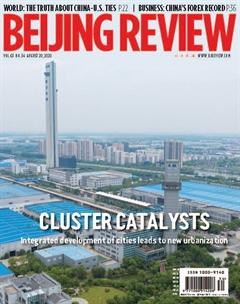Virtual Love
By Lu Yan
Xiao Yun, a 32-year-old office clerk in Dalian, Liaoning Province in northeast China, stayed at home due to the novel coronavirus disease in the first half of the year. But to her surprise, she was still able to go on blind dates with men chosen by her family members and friends.
“It was not as awkward as I expected. I had great conversations with all of them,”Xiao said. Blind dates via video link on social media app WeChat provide an opportunity for romance when many traditional meeting grounds for singles are closed.
Now that the epidemic is less severe and outdoor activities have resumed, Xiao said she will still have blind video dates because they are less limited by time and space. She has registered at an online dating platform so that she can “meet” more people and have a better chance to find her Mr. Right.

Where there is a need
Online and video dating are not new in China. Recent statistics released by analyst fi rm App Annie showed that downloads of dating apps in Chinas Apple Store have been on the rise, up nearly 40 percent from 2017 to 2019.
This year has seen a marked increase in users of online dating platforms. During the seven-day Spring Festival holiday in late January, the average time video dating users spent on Baihejiayuan, a Chinese matchmaking service platform with both brick-and-mortar outlets and online services, rose nearly 93 percent year on year. The time spent on the app in the entire month increased 801 percent over the previous year.
Ye Xuan, an executive of the Chengdu branch of Baihejiayuan in the southwestern province of Sichuan, told China News Service that since the beginning of the year, fewer people have visited their matchmaking offices. After the company launched a video dating feature on its app, an increasing number of customers have chosen to meet online. Face-to-face dating, which was the mainstream in the past, is decreasing.
Users can opt for a live-streaming chat room on the app and have conversations with viewers. As a paid service, Baihejiayuan will designate a matchmaker for online users, helping them to fi nd someone who meets their expectations and facilitating better communication between people on a date. Ye said online video dating has helped attract new customers, and the company will continue to explore new ways to meet users needs.
According to a survey released in July by Zhenai.com, a Chinese online matchmaking platform, people born in the 1980s and 1990s are the main users of online and video dating. Nearly 70 percent of its users consider it a good way to meet people and a time-saving and efficient way to expand their social circle. But there are also limitations. For example, they complain that some people lack sincerity, while others are too shy to communicate.
Also, the new dating form is sometimes abused by fraudsters and other criminals. Some people fabricate an identity and cheat others out of their money. Most apps require only a phone number and basic information such as gender, age, education and photos to register, which can be easily faked.
“Advanced verifi cation methods should be adopted such as facial and fingerprint recognition,” said Zhao Zhanling, a lawyer with Beijing Zhilin Law Firm.
Government departments and some civic organizations are also organizing online dating activities regularly. Single people can register for these events through their companies or the organizers, ensuring the authenticity of the participants information.
Online wedding guests
In August, Zhao Jiawen, a 30-year-old translator in Beijing, got married in Hebei Province in north China, her and her husbands hometown.

They had considered postponing the wedding if the epidemic was still rampant. Luckily, because of effective epidemic prevention and control, they were able to tie the knot on the date they had originally planned.
The ceremony was mainly attended by family members and friends living in their hometown. They asked some of their close friends living in other cities who were unable to attend the ceremony to send their wishes and congratulations via video, which were played at the ceremony.
“Due to the epidemic, we didnt go through a lot of preparations such as shopping for the bridal gown. Instead, we kept everything simple,” Zhao Jiawen said.
In April, Jiao Jiao and her groom wedded in Xian, Shaanxi Province in the northwest. In attendance were a wedding host, family members and friends wearing masks.
The wedding took less than 30 minutes with only the necessary procedures including exchanging rings, wedding vows and speeches.
The wedding banquet was omitted. The ceremony was broadcast live on a videostreaming app for 200,000 viewers, many of whom sent blessings online and virtual gifts.
In March, Liu Wenchao, an influencer with over 260,000 followers on Bilibili, a popular video-sharing platform, uploaded a one-hour video where he and his bride, in traditional wedding attire, sat in front of a desk and chatted with viewers from their home in Hangzhou, Zhejiang Province in the east.
By mid-August, the video had been viewed more than 5 million times and received 33,000 comments. “We are not alone. Now more people can watch our video and be witness to our love story,” Liu said.
Han Yangmin, head of the Research Center of Chinese Festival Culture, Northwest University in Liaoning, said the new types of wedding ceremony should be promoted because despite their simplicity, they have a sense of ritual and are environment-friendly.

